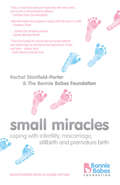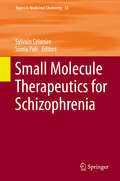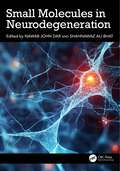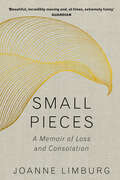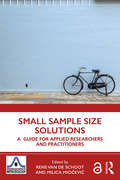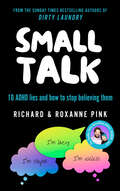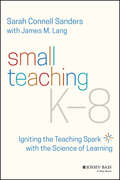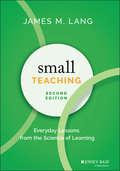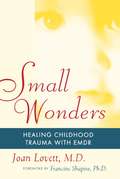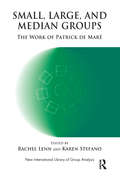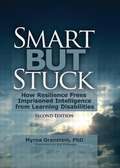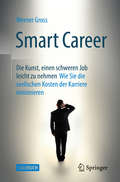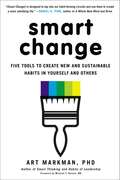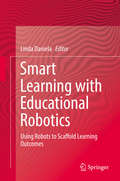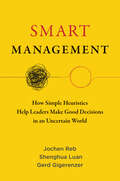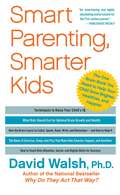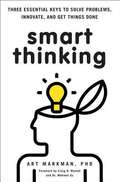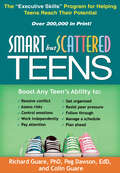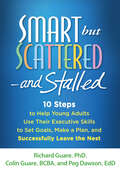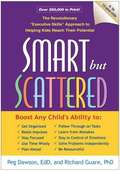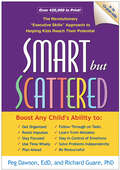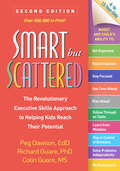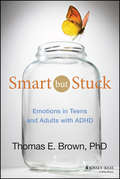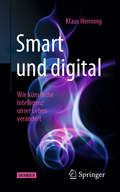- Table View
- List View
Small Miracles: Coping With Infertility, Miscarriage, Stillbirth and Premature Birth
by Rachel Stanfield-PorterSMALL MIRACLES is a landmark Australian self-help book offering practical advice, inspiration and comfort for anyone coping with the loss of a baby through miscarriage, stillbirth or prematurity and related issues such as infertility.
Small Molecule Therapeutics for Schizophrenia
by Sylvain Celanire Sonia PoliThe topic-related series Topics in Medicinal Chemistry covers all relevant aspects of drug research, e. g. pathobiochemistry of diseases, identification and validation of (emerging) drug targets, structural biology, drug ability of targets, drug design approaches, chemogenomics, synthetic chemistry including combinatorial methods, bioorganic chemistry, natural compounds, high-throughput screening, pharmacological in vitro and in vivo investigations, drug-receptor interactions on the molecular level, structure-activity relationships, drug absorption, distribution, metabolism, elimination, toxicology and pharmacogenomics. Medicinal chemistry is both science and art. The science of medicinal chemistry offers mankind one of its best hopes for improving the quality of life. The art of medicinal chemistry continues to challenge its practitioners with the need for both intuition and experience to discover new drugs. Hence sharing the experience of drug research is uniquely beneficial to the field of medicinal chemistry. Drug research requires interdisciplinary team-work at the interface between chemistry, biology and medicine.
Small Molecules in Neurodegeneration
by Nawab John Dar Shahnawaz Ali BhatNeurodegenerative diseases, like Alzheimer's, Parkinson's, and Huntington's, cast a long shadow over millions of lives, stealing memories, independence, and futures. The rising tide of these age-related disorders threatens to overwhelm healthcare systems worldwide, prompting an urgent search for effective treatments. While current options offer temporary relief, they fail to halt the relentless march of these devastating conditions. However, a beacon of hope shines at the intersection of cutting-edge neuroscience and the world of small molecules. These tiny chemical warriors, with their inherent advantages of cost-effectiveness, scalability, and diverse functionalities, are emerging as powerful weapons in the fight against neurodegeneration. This book stands as a testament to this increasing revolution. It investigates deep into the intricacies of small molecules, exploring their potential to unravel the mysteries of neurodegenerative diseases and pave the way for innovative therapeutic interventions.Key Features: Provides a comprehensive and accessible overview of the emerging field of small molecules in neurodegenerative diseases. Bridges the gap in current literature by addressing the specific impact of small molecules on these devastating conditions. Offers an in-depth exploration of the various mechanisms by which small molecules can combat neurodegeneration. Serves as a valuable resource for a wide audience, from students to professionals in the field. Lays the foundation for a deeper understanding of neurodegenerative diseases and unlocks new avenues for the development of effective therapies.
Small Pieces: A Book of Lamentations
by Joanne LimburgThis is Joanne's account of coming to terms with her brother's suicide and through that process, the entirety of her family life. In Small Pieces Joanne explores her childhood, her Jewishness and her mother's death as well as that of her brother.The life and family Joanne describes is a complex combination of conflicting influences - both scientific and literary; Jewish and humanist impulses; and middle America and North London settings.Small Pieces is a beautiful and searingly honest meditation on family and faith.
Small Sample Size Solutions: A Guide for Applied Researchers and Practitioners (European Association of Methodology Series)
by Rens Van De Schoot Milica Mio 269 Evi 263Researchers often have difficulties collecting enough data to test their hypotheses, either because target groups are small or hard to access, or because data collection entails prohibitive costs. Such obstacles may result in data sets that are too small for the complexity of the statistical model needed to answer the research question. This unique book provides guidelines and tools for implementing solutions to issues that arise in small sample research. Each chapter illustrates statistical methods that allow researchers to apply the optimal statistical model for their research question when the sample is too small. This essential book will enable social and behavioral science researchers to test their hypotheses even when the statistical model required for answering their research question is too complex for the sample sizes they can collect. The statistical models in the book range from the estimation of a population mean to models with latent variables and nested observations, and solutions include both classical and Bayesian methods. All proposed solutions are described in steps researchers can implement with their own data and are accompanied with annotated syntax in R. The methods described in this book will be useful for researchers across the social and behavioral sciences, ranging from medical sciences and epidemiology to psychology, marketing, and economics.
Small Talk: 10 ADHD Lies and How to Stop Believing Them
by Richard Pink Roxanne PinkThe beloved authors of Dirty Laundry break down the harmful stereotypes about people with ADHD to help you stop being your worst fear-leader, start bigging yourself up, and live your best neurodivergent life. When &“ADHD wife&” Roxanne Pink and neurotypical husband Richard Pink asked their community of 2.5 million what the biggest ADHD struggle is, the thousands of replies changed everything. As they learned, the real enemy isn&’t productivity or focus, but the toxic ADHD core beliefs we&’ve internalized. With candor and kindness, they share personal stories to highlight and reframe the 10 big lies that ADHD people believe about themselves. From &“I am lazy&” to &“Everybody hates me&” and &“I quit everything I start,&” Small Talk will empower ADHDers and those who love them to navigate life with compassion, humor, and hope. Whether you were diagnosed early or are new to the neurospicy community, Small Talk will change your relationship with yourself and others. Learn how to:• Identify your limiting ADHD beliefs• Break free from neurotypical standards• Support and understand your ADHDers• Adopt a self-kindness mindset• Communicate your needs & boundaries• Celebrate the joys of ADHD
Small Teaching K-8: Igniting the Teaching Spark with the Science of Learning
by James M. Lang Sarah Connell SandersCognitive science research-based teaching techniques any educator can implement in their K-8 classroom In Small Teaching K-8, a team of veteran educators bridges the gap between cognitive theory and the K-8 classroom environment, applying the same foundational research found in author James Lang&’s bestselling Small Teaching: Everyday Lessons from the Science of Learning to the elementary and middle school setting. Via clear descriptions and step-by-step methods, the book demonstrates how to integrate simple interventions into pre-existing pedagogical techniques to dramatically improve student outcomes. The interventions consist of classroom or online learning activities, one-time additions, or small modifications in course design or communication. Regardless of their form, they all deliver powerful, positive consequences. In this book, readers will also find: Foundational concepts from up-to-date cognitive research that has implications for classroom teaching and the rationales for using them in a K-8 classroom Concrete examples of how interventions have been used by faculty in various disciplines Directions on the specific timing of each intervention, backed by evidence-based reasons An essential resource for K-8 educators seeking ways to improve their efficacy in the classroom, Small Teaching K-8 offers teachers intuitive and actionable advice on helping students absorb and retain knowledge for the long-term.
Small Teaching: Everyday Lessons from the Science of Learning
by James M. LangA freshly updated edition featuring research-based teaching techniques that faculty in any discipline can easily implement Research into how we learn can help facilitate better student learning—if we know how to apply it. Small Teaching fills the gap in higher education literature between the primary research in cognitive theory and the classroom environment. In this book, James Lang presents a strategy for improving student learning with a series of small but powerful changes that make a big difference―many of which can be put into practice in a single class period. These are simple interventions that can be integrated into pre-existing techniques, along with clear descriptions of how to do so. Inside, you’ll find brief classroom or online learning activities, one-time interventions, and small modifications in course design or student communication. These small tweaks will bring your classroom into alignment with the latest evidence in cognitive research. Each chapter introduces a basic concept in cognitive research that has implications for classroom teaching, explains the rationale for offering it within a specific time period in a typical class, and then provides concrete examples of how this intervention has been used or could be used by faculty in a variety of disciplines. The second edition features revised and updated content including a newly authored preface, new examples and techniques, updated research, and updated resources. How can you make small tweaks to your teaching to bring the latest cognitive science into the classroom? How can you help students become good at retrieving knowledge from memory? How does making predictions now help us learn in the future? How can you build community in the classroom? Higher education faculty and administrators, as well as K-12 teachers and teacher trainers, will love the easy-to-implement, evidence-based techniques in Small Teaching.
Small Wonders
by Joan LovettChildhood can be an exciting time, full of joyous exploration, new skills, friends, and imaginative play. It can also be very frightening, especially when children have experiences that threaten their feelings of safety and well-being. Even common traumatic childhood events can deeply affect children's normal healthy development, their self-esteem, and their families. Many behavioral problems stemming from common traumatic events could require years of psychotherapy or medication. That is, they did -- until the advent of EMDR. Developed by psychologist Francine Shapiro in the late 1980s, EMDR had already helped thousands of adult clients when Joan Lovett experienced its healing power firsthand. Eye movement desensitization and reprocessing (EMDR) is a comprehensive therapeutic approach that helps patients release disturbing thoughts and emotions that originate in traumatic experiences. Experiences can be traumatic in the commonly accepted sense -- abuse, disasters, violence -- but children may also perceive and respond to more ordinary events as very threatening. A playground accident, the loss of a loved one, school problems, or choking on a piece of popcorn can be a part of growing up. They can also be critical incidents that cause a child to view him- or herself as helpless or powerless, to become fearful, and to develop debilitating behavioral problems. In Small Wonders: Healing Childhood Trauma with EMDR, Joan Lovett, M.D., shares engaging clinical stories -- mysteries involving children who present her with puzzling and disturbing behaviors. She imaginatively focuses her knowledge of pediatrics, play therapy, and EMDR to alleviate the real-life ordeals of real-life children. Featuring a foreword by Francine Shapiro, Small Wonders is the most comprehensive and insightful book to explore the potential of EMDR for child therapy. This enlightening book is intended for parents who are concerned with having their children feel confident, for adults who want insights into the way the events of their childhood shaped their self-image, and for professionals who want to know more about EMDR and how it can be adapted to meet the special needs of traumatized children.
Small, Large and Median Groups: The Work of Patrick de Mare (The New International Library of Group Analysis)
by Rachel Lenn Karen Stefano'This book is a remarkable tribute to the memory of Pat de Mare. You will find in these pages a selection of his work that represents his new and different understanding of groups, both large and small, that has not only had a significant impact on the practice of group therapy in his lifetime, but also a potential for revolutionizing current thinking both now and in the future. The editors are owed a great debt of gratitude for putting so much important work together. They have organized the book around three sections on the small, median and large groups. What is particularly moving is that each section is introduced by some of Pat's closest friends and colleagues. These introductions are not only invaluable preparation for reading the articles by Pat that follow, but are also a poignant tribute to the writers' lives, work, their thinking and much happiness that came from their close relationship with Pat.
Smart But Stuck: How Resilience Frees Imprisoned Intelligence from Learning Disabilities, Second Edition
by Myrna OrensteinSmart But Stuck, Second Edition, is an updated look at how smart people with learning gaps can not only overcome them, but become successful in learning-and life. The new edition of this classic explores the emotional aspects of learning disabilities and imprisoned intelligence, showing how-and why-smart people with learning disabilities are resilient, and how they help themselves to struggle, survive, and achieve.
Smart Career: Wie Sie die seelischen Kosten der Karriere minimieren
by Werner GrossIn diesem Sachbuch soll es einmal nicht nur um die Schokoladenseiten der Karriere gehen, sondern auch um die Schattenseiten: Selbstdisziplin bis zur Selbstverleugnung, übertriebene Außenorientierung und exzessive Anpassungsleistungen nach unausgesprochenen Wohlverhaltensklauseln produzieren mitunter zunehmendes Fassadenverhalten: Stoßfest, bruchsicher, formschön und abwaschbar heißt für viele die Devise auf der Karriereleiter. Gar nicht so selten geht damit ein schleichender Verlust der Menschlichkeit einher. Geschrieben für Laien und Interessierte; Psychotherapeuten, Coaches, Berater können prozessbegleitend empfehlen. Aus dem Inhalt: Die beruflichen Anforderungen bis zum Jahr 2025 – Gefahren auf der Karriereleiter (körperliche, seelische, soziale) – Warum und wie man in berufliche Krisen gerät – Krise als Chance und als Möglichkeit, sein Leben neu auszurichten – 4 Bereiche einer gesunden Identität – „Funktionslust“ oder: der Spaß am Beruf – Von der Karriereleiter zum Karrierenetzwerk – Zwischen Effizienz und Menschlichkeit: Ressourcen aktivieren, psychosoziale Reibungsverluste minimieren, Arbeitsprozesse optimieren, angemessene Problemlösungen finden – Gibt es mehr im Leben, als Effizienz und Geschwindigkeit zu erhöhen? – Expatriates, Downshifting und Sabbatical – Hilfen von außen: Coaching, Supervision, Psychotherapie. Über den Autor: Werner Gross, Dipl.-Psychologe, Psychotherapeut, Supervisor und Coach, Organisations- und Unternehmensberater.
Smart Change
by Art MarkmanEvery day millions of people log onto Facebook to connect with friends. Each time we do this we are creating and reinforcing habits. We have routines for checking news from friends, looking up birthdays and family updates. When the interface of Facebook was changed in 2011 there was widespread condemnation. We are, in short, creatures of habit. Habits may help us to carry out our daily routine but they often cause us trouble, from unhealthy eating and smoking, to poor study skills and work routines. We've all experienced that endless frustration when we try to kick a bad habit. The frustration you have now will soon be over. Premier cognitive scientist Art Markman draws on all the latest scientific research to help you succeed in beating those bad habits. With the help of Smart Change, not only will you be able to understand just how habits are formed and maintained but you will be equipped with 5 essential tools to help you change your behaviour for the better and, what's more, influence the behaviour of others at work and at home.
Smart Learning with Educational Robotics: Using Robots to Scaffold Learning Outcomes
by Linda DanielaThis book will offer ideas on how robots can be used as teachers' assistants to scaffold learning outcomes, where the robot is a learning agent in self-directed learning who can contribute to the development of key competences for today's world through targeted learning - such as engineering thinking, math, physics, computational thinking, etc. starting from pre-school and continuing to a higher education level. Robotization is speeding up at the moment in a variety of dimensions, both through the automation of work, by performing intellectual duties, and by providing support for people in everyday situations. There is increasing political attention, especially in Europe, on educational systems not being able to keep up with such emerging technologies, and efforts to rectify this. This edited volume responds to this attention, and seeks to explore which pedagogical and educational concepts should be included in the learning process so that the use of robots is meaningful from the point of view of knowledge construction, and so that it is safe from the technological and cybersecurity perspective.
Smart Management: How Simple Heuristics Help Leaders Make Good Decisions in an Uncertain World
by Gerd Gigerenzer Jochen Reb Shenghua LuanWhy successful leaders must embrace simple strategies in an increasingly uncertain and complex world.Making decisions is one of the key tasks of managers, leaders, and professionals. In Smart Management, Jochen Reb, Shenghua Luan, and Gerd Gigerenzer demonstrate how business leaders can utilize heuristics—simple decision-making strategies adapted to the task at hand. In a world that has become increasingly volatile, uncertain, complex, and ambiguous (VUCA), the authors make the case against complex analytical methods that quickly reach their limits. This against-the-grain approach leads to decisions that are not only faster but also more accurate, transparent, and easier to learn about, communicate, and teach. Smart Management offers an evidence-based yet practical discussion of how business leaders can use smart heuristics to make good decisions in a VUCA world.Building on the fast-and-frugal heuristics program, Smart Management demonstrates the efficacy of heuristic decision making in a twofold approach. First, it introduces the concept of ecological rationality, which prescribes the environmental conditions under which specific heuristics work well. Second, the book describes a repertoire of heuristics, referred to as the adaptive toolbox, that leaders, managers, and professionals can develop and rely on to make a variety of decisions, such as on business strategy, negotiation, and personnel selection. The toolbox not only showcases the practical usefulness of these heuristics but also inspires readers to discover and develop their own smart heuristics.
Smart Parenting, Smarter Kids
by Dr David WalshEvery week new discoveries about the brain make the news, often promising parents the latest "right" way to nurture their kids' developing brains and behavior. And every day there's a new technology that demands your child's attention, a new game or toy that purports to make your kid smarter, and a new snack promising to be healthy as well as tasty. How's a busy parent to make heads or tails of all these claims? You turn to Dr. David Walsh, an expert at translating the headline-making, cutting-edge findings into practical suggestions for parenting today. In his previous bestseller, Why Do They Act That Way?, Walsh showed how to manage the difficult teenage years by understanding how the adolescent brain develops. Now he's written a complete guide to parenting from birth through the teen years, with recommendations that will help maximize any child's potential. Smart Parenting, Smarter Kids doesn't just describe new research findings or explain interesting brain facts. It equips parents with usable information across a range of topics, like exercise, nutrition, play, sleep, stress, self-discipline, emotional intelligence, and connection. Some discoveries in neuroscience confirm age-old parental wisdom while others may prompt you to make immediate changes. Still other brain discoveries help explain behaviors that have puzzled parents forever, like why friendly, easygoing kids can become withdrawn and sullen dragons overnight when they enter adolescence, or why girls and boys tend to have such different classroom experiences. Filled with helpful quizzes and checklists for easy reference, Smart Parenting, Smarter Kids gives specific advice about how to make the best daycare, preschool, and schooling decisions for your kids; for example, how to deal with stressful events as a family, and how to manage your child's internet and media use. And all these findings across different fields of research work together in reaching the same goal: When children are guided to eat, sleep, play, exercise, learn, and connect with others in healthy ways, their minds blossom and they are able to reach their full potential--academically, socially, physically, and emotionally. These real-life applications in Dr. Walsh's new book put science into practice with a personal plan that explains how (and why) you can parent with the brain in mind.
Smart Parenting, Smarter Kids: The One Brain Book You Need to Help Your Child Grow Brighter, Healthier, and Happier
by David WalshEvery week new discoveries about the brain make the news, often promising parents the latest "right" way to nurture their kids' developing brains and behavior. And every day there's a new technology that demands your child's attention, a new game or toy that purports to make your kid smarter, and a new snack promising to be healthy as well as tasty. How's a busy parent to make heads or tails of all these claims? You turn to Dr. David Walsh, an expert at translating the headline-making, cutting-edge findings into practical suggestions for parenting today. In his previous bestseller, Why Do They Act That Way?, Walsh showed how to manage the difficult teenage years by understanding how the adolescent brain develops. Now he's written a complete guide to parenting from birth through the teen years, with recommendations that will help maximize any child's potential. Smart Parenting, Smarter Kids doesn't just describe new research findings or explain interesting brain facts. It equips parents with usable information across a range of topics, like exercise, nutrition, play, sleep, stress, self-discipline, emotional intelligence, and connection. Some discoveries in neuroscience confirm age-old parental wisdom while others may prompt you to make immediate changes. Still other brain discoveries help explain behaviors that have puzzled parents forever, like why friendly, easygoing kids can become withdrawn and sullen dragons overnight when they enter adolescence, or why girls and boys tend to have such different classroom experiences. Filled with helpful quizzes and checklists for easy reference, Smart Parenting, Smarter Kids gives specific advice about how to make the best daycare, preschool, and schooling decisions for your kids; for example, how to deal with stressful events as a family, and how to manage your child's internet and media use. And all these findings across different fields of research work together in reaching the same goal: When children are guided to eat, sleep, play, exercise, learn, and connect with others in healthy ways, their minds blossom and they are able to reach their full potential--academically, socially, physically, and emotionally. These real-life applications in Dr. Walsh's new book put science into practice with a personal plan that explains how (and why) you can parent with the brain in mind.
Smart Thinking: Three Essential Keys to Solve Problems, Innovate, and Get Things Done
by Art MarkmanWhen you understand how the mind works, you can think smarter-and act smarter. Based on the precepts of cognitive science and drawing on a half century of interdisciplinary studies, Smart Thinking is the first book to reveal a three-part formula that distinguishes Smart Thinking from innate intelligence and shows how memory works, how to learn effectively, and how to use knowledge when you need to get things done. Beginning with defining the difference between Smart Thinking and innate or raw intelligence, cognitive psychologist Art Markman demonstrates how it is possible to learn Smart Thinking that you can apply to the real world. This engaging and practical book introduces a three-part formula for Smart Thinking, which demonstrates how anyone can: Develop Smart Habits Acquire High-Quality Knowledge Use High-Quality Knowledge when needed Smart Thinking explores each part of the Smart Thinking formula and provides: An understanding of how the mind works and the means to replace self-limiting habits with those that foster Smart Thinking Insights into how memory functions and how to improve the quality of what you learn Ways to present new information effectively Specific techniques for improving your understanding of how the world works The ability to define and solve problems by finding the relevant knowledge from any area of expertise and applying it effectively Drawing on multiple research disciplines, including psychology, artificial intelligence, philosophy, neuroscience, learning sciences, linguistics, anthropology, sociology, and education, Markman provides insights into the functioning of the mind and synthesizes this understanding into practical tools and exercises that develop new skills and achieve personal goals. The book culminates in tips for creating a Culture of Smart to make everyone in an organization more effective. .
Smart but Scattered Teens: The "Executive Skills" Program for Helping Teens Reach Their Potential
by Peg Dawson Richard Guare Colin Guare"I told you, I'll do it later." "I forgot to turn in the stupid application." "Could you drive me to school? I missed the bus again." "I can't walk the dog--I have too much homework!"If you're the parent of a "smart but scattered" teen, trying to help him or her grow into a self-sufficient, responsible adult may feel like a never-ending battle. Now you have an alternative to micromanaging, cajoling, or ineffective punishments. This positive guide provides a science-based program for promoting teens' independence by building their executive skills--the fundamental brain-based abilities needed to get organized, stay focused, and control impulses and emotions. Executive skills experts Drs. Richard Guare and Peg Dawson are joined by Colin Guare, a young adult who has successfully faced these issues himself. Learn step-by-step strategies to help your teen live up to his or her potential now and in the future--while making your relationship stronger. Helpful worksheets and forms can be downloaded and printed in a convenient 8 1/2" x 11" size. See also the authors' Smart but Scattered (with a focus on 4- to 13-year-olds) and their self-help guide for adults. Plus, Work-Smart Academic Planner: Write It Down, Get It Done, designed for middle and high school students to use in conjunction with coaching, and related titles for professionals. Winner (Third Place)--American Journal of Nursing Book of the Year Award, Consumer Health Category
Smart but Scattered--and Stalled: 10 Steps to Help Young Adults Use Their Executive Skills to Set Goals, Make a Plan, and Successfully Leave the Nest
by Peg Dawson Richard Guare Colin GuareWhether you're a young adult who is stalled on the journey to independence--or a concerned parent still sharing the family nest--this compassionate book is for you. Providing a fresh perspective on the causes of failure to launch, the expert authors present a 10-step plan that helps grown kids and parents work together to achieve liftoff. Learn why brain-based executive skills such as planning, organization, and time management are so important to success, and what you can do to strengthen them. You get downloadable practical tools for figuring out what areas to target, building skills, identifying a desired career path, and making a customized action plan. Vivid stories of other families navigating the same challenges (including father and son Richard and Colin Guare) reveal what kind of parental support is productive--and when to let go.
Smart but Scattered: The Revolutionary "Executive Skills" Approach to Helping Kids Reach Their Potential
by Peg Dawson Richard GuareDawson and Guare (psychology, Center for Learning and Attention Disorders) have written this guide for parents who need their children to develop "executive skills," or the ability to complete tasks and solve problems in a timely and organized manner. The authors provide step-by-step instructions on how to identify the strengths and weaknesses of these children, and how to prepare a customized set of behavioral exercises that will motivate them toward improved work and study habits while controlling impulsive or emotional behaviors. A chapter is also included to help parents identify behavioral issues, such as attention-deficit disorders, that may require professional intervention. Annotation ©2009 Book News, Inc., Portland, OR (booknews.com)
Smart but Scattered: The Revolutionary "Executive Skills" Approach to Helping Kids Reach Their Potential
by Peg Dawson Richard GuareThere's nothing more frustrating than watching your bright, talented son or daughter struggle with everyday tasks like finishing homework, putting away toys, or following instructions at school. Your "smart but scattered" child might also have trouble coping with disappointment or managing anger. Drs. Peg Dawson and Richard Guare have great news there's a lot you can do to help. The latest research in child development shows that many kids who have the brain and heart to succeed lack or lag behind in crucial "executive skills"--the fundamental habits of mind required for getting organized, staying focused, and controlling impulses and emotions. Learn easy-to-follow steps to identify your child's strengths and weaknesses, use activities and techniques proven to boost specific skills, and problem-solve daily routines. Small changes can add up to big improvements--this empowering book shows how.
Smart but Scattered: The Revolutionary Executive Skills Approach to Helping Kids Reach Their Potential
by Peg Dawson Richard Guare Colin GuareAll kids occasionally space out, get sidetracked, run out of time, or explode in frustration/m-/but some do it much more often than others. If you have a &“smart but scattered&” child, take heart. This encouraging guide is grounded in research on the crucial brain-based skills that 4- to 13-year-olds need to get organized, stay focused, and control their impulses and emotions. The expert authors guide you to identify your child's executive strengths and weaknesses, boost skills that are lacking, fix everyday routines that don't work, and reduce [ital]everyone's[/ital] stress. Including new research, new and updated vignettes, and "A Good Place to Start" suggestions for each skill, the revised and updated second edition features a new chapter on technology and a greatly expanded school chapter. Helpful practical tools can be downloaded and printed. See also the authors' Smart but Scattered Teens, Smart but Scattered--and Stalled (with a focus on emerging adults), and The Smart but Scattered Guide to Success (with a focus on adults).
Smart but Stuck
by Thomas E. BrownCompelling stories that present a new view of ADHD Smart but Stuck offers 15 true and compelling stories about intelligent, capable teens and adults who have gotten "stuck" at school, work, and/or in social relationships because of their ADHD. Dr. Brown highlights the often unrecognized role that emotions play in this complex disorder. He explains why even very bright people with ADHD get stuck because they can focus well on some tasks that interest them, but often can't focus adequately on other important tasks and relationships. The first book to explain and illustrate the crucial role of emotions in the daily functioning of those living with ADHD Brown, Associate Director of the Yale Clinic for Attention & Related Disorders, is an internationally known authority on ADHD Drawing on the latest research findings, the book describes strategies and treatments for getting "unstuck" to move on to a more rewarding and productive life.
Smart und digital: Wie künstliche Intelligenz unser Leben verändert
by Klaus HenningKünstliche Intelligenz verändert alles.Dieses Buch ermutigt, sich der Herausforderung durch die digitale Transformation mit Künstlicher Intelligenz zu stellen. Der Leser erfährt, warum diese Transformation als größte Kulturrevolution seit der Erfindung des Massenbuchdrucks anzusehen ist und wie diese wert-orientiert positiv gestaltet werden kann. Dabei verfolgt der Autor die These, dass Intelligente Objekte im Netz und Gegenstände dieser Welt ein eigenes Bewusstsein bekommen. Er zeigt anhand vieler Beispiele, wie diese digitalen Begleiter zu unseren digitalen Partnern werden. Dieses Sachbuch gibt viele Anregungen für das eigene Lebens- und Arbeitsumfeld und ist voller Beispiele für die Umsetzung von Systemen der künstlichen Intelligenz. Der Leser erfährt, was heute schon geht und was in den nächsten zehn bis zwanzig Jahren zu erwarten ist. Das Werk ist für alle interessant, die sich für KI und die digitale Transformation interessieren – von Verantwortlichen in Unternehmen, öffentlichen Einrichtungen und Politik, wie auch alle Lehrer und Eltern, die verstehen wollen, was die nächste Generation erwartet.
